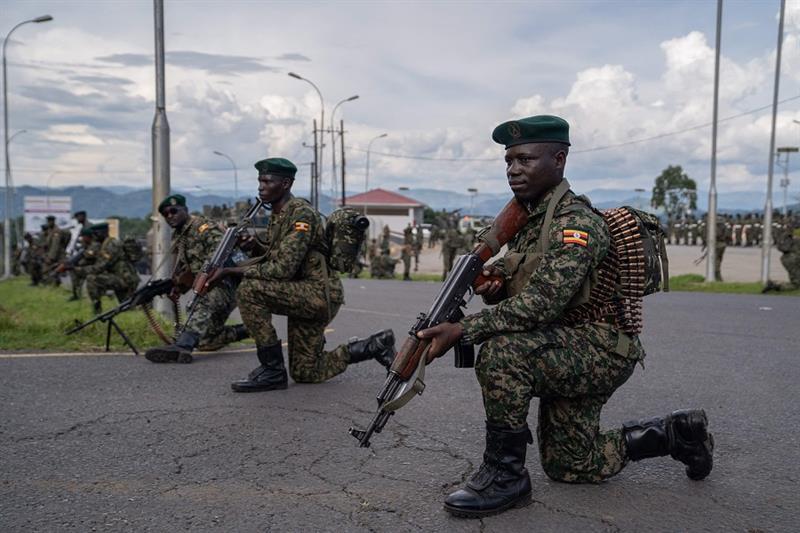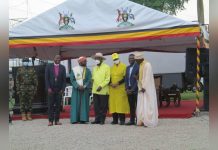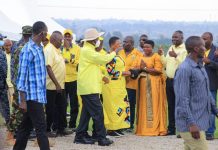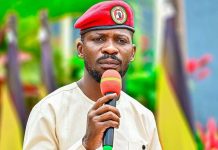Faridah N Kulumba
Africa-Press – Uganda. On 29th March 2023, the Ugandan government flagged off the 5,000 People’s Defence Forces (UPDF) army for a peace mission in the Democratic Republic of Congo (DRC).
The government of Uganda promised last year to send 1,000 troops to DR Congo to join a regional force mandated to help end decades of instability in the North Kivu province.
Last week on Friday, the UPDF entered the east DR Congo border town of Bunagana to bring peace to the troubled region that has been disrupted by wars that began in the 20th century.
Security no any other business
Lt Gen Kayanja Muhanga who flagged off the Ugandan troop assured that, unlike the other Ugandan soldiers such as operation Shujaa who are in DRC Congo to attack Ugandan rebel troops, this time round the mission is to bring peace and stability in Rutshuru territory and neighboring areas in the North Kivu province.
The Ugandan troops are intended to supervise the gradual withdrawal of the M23 rebel group, which has conquered swathes of territory in eastern Congo and inflamed regional tensions. But there are also a proliferating number of conventional armies operating in the region.
Eastern DR Congo already hosts hundreds of Ugandan troops, that were deployed in November 2021, under a separate bilateral arrangement to help hunt down the Islamic State-allied group.
In this agreement, Uganda and DR Congo launched a joint operation against the Allied Democratic Forces (ADF), an armed group allied with Islamic State. The army conducted search operations in the wake of air and artillery strikes against suspected ADF bases in the forests of eastern Congo. Hundreds of Ugandan soldiers and dozens of armored vehicles crossed the border at Nobili.
Pierre Bisselet from Kivu Security Tracker, which monitors unrest in the region, said the scale of Uganda’s deployment was the largest foreign intervention in DR Conga in over a decade, apart from a United Nations (UN) peacekeeping operation.
The agreement
Last year, seven heads of state from the East African Community (EAC) including Uganda, Rwanda, Kenya, Burundi, Tanzania, South Sudan, and DR Congo agreed to establish a joint force led by Kenya to help restore peace and stability in Congo’s volatile Borth Kivu, South Kivu, and Ituri provinces.
The forces are led by the command of Kenyan General Jeff Nyagah, who since November last year has been based in Goma, a major city near which the M23 has concentrated its activity.
At first, the priority was to destroy the M23 but some leaders of the seven countries comprising it have since said it is only a “neutral” force.
Ugandan opposition challenged the deployment
On 3rd April 2021, the Deputy Information and Publicity for the Forum for Democratic Change Party John Kikonyogo while speaking to Africa-Press tasked the Parliament of Uganda to explain why the country sent troops to DR Congo when they cannot pardon Uganda the compensation for invasion and looting by UPDF.
Mr. Kikonyogo also went ahead and asked how Uganda gained from this deployment.
On 1st September, the government of Uganda started payment of USD 325 million (about Shs 1.23 trillion) compensation to DR Congo. Uganda paid the first annual installment of USD 65 million in reparation for the invasion and looting by UPDF during the Congo war 20 years ago.
The compensation is to be paid in five installments of USD 65 million, starting on September 1st last year and every September 1st for the following years.
In 1999, DR Congo petitioned the International Court of Justice (ICJ) accusing Uganda’s armed forces of destroying properties, lives, and natural resources when it invaded the country in 1998.
In the past years, Uganda has been interfering in DR Congo’s security affairs.
Uganda first went to DR Congo in 1996 to support rebel groups fighting against the government of former President of Congo Joseph Desire Mobutu Sese Seko claiming that Congolese armed groups allied to his government were a threat to
Uganda’s security
After Mobutu was overthrown by his son Laurent Desire Kabira, the new president found himself in conflicts with his former allies, Uganda and Rwanda, whom he accused of supporting a planned coup. Kabira decided to expel all foreign forces including Uganda.
In 2005, the International Court of Justice ruled that Uganda had violated international norms as an occupying force between 1998 and 2003. The judges found that Uganda was responsible for the deaths of 10,000-155,000 Congolese in the eastern Ituri region. Ugandan troops were also found guilty of looting gold, diamonds, and timber.
The opposition legislators opposed the ICJ ruling on Uganda. One legislator, SSemuju Nganda said that it would have been fair to charge the individuals who looted the resources from DRC not the country as a whole because the compensation will affect the economy.
Rebel groups in DR Congo
More than 120 armed groups are operating across large swathes of eastern Congo, including M23 rebels, which the government of DR Congo has repeatedly accused Rwanda of supporting, but Rwanda denied the accusations.
The M23 have staged a major offensive this year, seizing territory, forcing thousands of people from their homes, and sparking a diplomatic row between DR Congo and Rwanda. The M23 rebels, largely Congolese Tutsi militia, have seized swaths of territory across North Kivu province, edging toward the region’s main city of Goma.
For More News And Analysis About Uganda Follow Africa-Press






